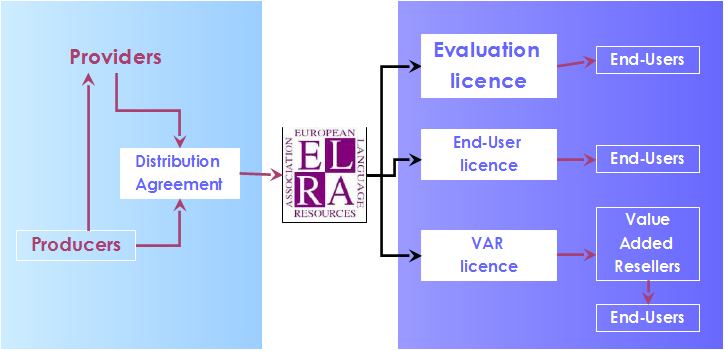Latest News
- New LRs in the ELRA Catalogue July 25, 2024
- New LRs in the ELRA Catalogue June 5, 2024
- New LRs in the ELRA Catalogue Dec. 7, 2023
- New LRs in the ELRA Catalogue Nov. 13, 2023
- The LDS vision by Philippe Gelin Oct. 17, 2023
Licensing
Marketing Language Resources (LRs) and creating an equitable and balanced framework is not easy. One of the ELRA’s jobs is therefore to simplify the relationship between producers/providers and users of LRs. To do this, it has developed generic contracts.
With the exception of commercial publishing ventures, the core business of most LR providers is not LR production, collection and/or validation. In practice, most of them develop or acquire resources for their own internal needs. In order to encourage them to make such data available to others, ELRA has drafted generic contracts defining the responsibilities and obligations of both parties.
To minimize variations in agreements and to keep things simple, these contracts are based on the following model:

This model takes the interest of both parties (producers and users), into account, in keeping with ELRA’s role as a neutral, non-profit organisation, dedicated to promoting the language engineering field in Europe.
Contracts will be drawn up between ELRA and the resource provider and/or ELRA and the resource user (either a VAR, Value Added Reseller, or End-user). In this context, it is important to note that ELRA assumes that all resource providers/owners have the appropriate rights to the material they are offering. The generic contracts should be regarded as guidelines for drafting specific agreements. They are based both on legal principles, on common sense and market conditions, and are easy to understand, to implement, and to apply. As a result, they may well evolve in the light of feedback from our members, customers and resources providers.
General framework of the contract
The general framework, i.e. the preamble of the agreement, describes the provider (legal forms, intent, etc.) and ELRA and its objectives. It also defines the terms used within the contract and draws attention to essential features that can/should apply. This should enable accurate and complete formulation and prevent any subsequent differences of opinion due to different understanding of terms rather than concepts.
Object of the contract
Contracts between ELRA and LR provider grant distribution licenses by the provider to ELRA. In other words, the purpose of the contract is for the provider to supply the LRs and to receive, payment, royalties or other compensation in return. The contract lays down that the LRs must be delivered with any necessary documentation in a specified language. It also stipulate that ELRA is allowed to publicize the existence and availability of the LRs in its catalogues, and to reproduce, and duplicate them for distribution purposes in accordance with its marketing, distribution, and commercialization policy. Alternatively, these tasks can be undertaken by the provider (in this case the terms and conditions must be specified).
ELRA agrees to distribute the LRs and grants its users -i.e. members and customers- the right to use them, in full or in part, for the purposes defined in the agreement between ELRA and the provider, at the user’s institution or site.
The contract between ELRA and the users grants the latter a non-exclusive, non transferable right to use, rework and build on the LRs for the purposes agreed upon between the provider and ELRA within the user’s institution. To this extent the user is allowed to create derivative works or software for his/her own internal research and development activities from the LRs or any component of them.
The agreements make no provision for the user to acquire any ownership, rights, title, or interest in the LRs. User acknowledges the right of the provider in the LRs and related materials including support documentation, and he will not infringe them in any way.
One point that has to be clearly defined is what usage is allowed: some providers allow their resources to be used for research and technology/product development, while others only allow distribution for research purposes.
ELRA states that in all cases the user shall not copy or redistribute the LRs, although backup copies may be made. Any use of LRs by an affiliate, subsidiary, or other entity outside the user’s place of business must be negotiated. In particular, the use of LRs or parts of them in any documentation, application or service which is charged for by the user, may be subject to a separate agreement. The contract may also states that the user has to obtain prior permission to sell or redistribute any product or derivative work based on the LRs.
A clause may stipulate that ELRA is authorized to reproduce and duplicate the LRs and any relevant documentation, in whole or in part, plus any summaries, compilations, or translations of the documentation for the purpose of distribution in accordance to the agreement. This has to be made explicit in the contract.
In general, LRs are provided on an “as is with all defects” basis. ELRA and the provider make no representation or warranties of any kind, either expressed or implied. In particular, all warranties for merchantability and/or fitness for a particular purpose are expressly excluded.
A detailed technical specification of the resources is given in a separate appendix to ensure clear identification and avoid subsequent differences of opinion.
Fees payable, which are determined in accordance with a schedule, are also attached as appendices. It is possible to update them yearly.
Agreements are entered into in a good faith, if a dispute arises between the parties to the contract, they are bound to give notice of it in writing and try to reach an agreement. If no agreement is possible, the parties can either agree to arbitration or refer the matter to litigation.